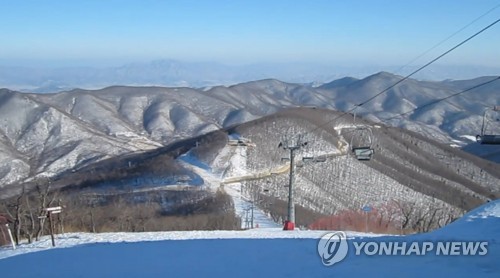South Korea will use a chartered plane to fly its skiers to North Korea for joint training and will not pay the airport fee to the North, as such a payment would violate international sanctions, Seoul officials said Monday.
The South plans to use Kalma Airport, a military airfield in the North's eastern port city of Wonsan, to transport South Korean non-Olympic skiers to Masikryong Ski Resort, a roughly 45-minute drive from the airport. The two-day training is likely to take place as early as Wednesday.
Seoul is agonizing over how to support North Korea's participation in the PyeongChang Winter Olympics, while not directly providing cash to the North. Cash payments to North Korea are banned under a set of United Nations and major countries' unilateral sanctions.
"The North will provide the necessary convenience as to the use of the airport," Baik Tae-hyun, spokesman at Seoul's unification ministry, told a press briefing.
The spokesman said that the South will not pay the fees for using the North's airport and airspace.

Critics also said that if Seoul charters a plane from an airline which is currently providing flights to the U.S., the move would violate U.S. sanctions.
U.S. President Donald Trump announced a set of sanctions in September that include banning vessels and aircraft that have visited North Korea from visiting the U.S. within 180 days.
"When it comes to joint events, the South is in consultation with the U.S. and the international community in a bid not to spark a row over a possible violation of sanctions," Baik said.
The two Koreas earlier agreed to hold joint events -- the joint ski exercises and a cultural performance at Mount Kumgang on the North's east coast -- ahead of the Winter Olympics.
The South may have to bring refined petroleum products to the North when it holds the cultural event there, as Pyongyang said it will be difficult for it to stably supply power to a facility built by the South Korean side.
For the event, Seoul is likely to use a diesel-fueled electric generator, which Hyundai Asan, a South Korean operator of the now-suspended joint tour program to Mount Kumgang, previously used.
But the delivery of refined petroleum products to the North could be tricky as the U.N. Security Council in December 2017 adopted sanctions that include a cap on exports of such goods to the North to 500,000 barrels per year.
Washington's sanctions in August also aim to ban exports of crude oil and petroleum products to North Korea due to its nuclear and missile programs.
Government officials estimate that some 10,000 liters of diesel fuel might be needed for the upcoming events.

